人教版(2019)必修 第一册Unit 5 Languages around the world Reading for writing 写作课件(共19张PPT)
文档属性
| 名称 | 人教版(2019)必修 第一册Unit 5 Languages around the world Reading for writing 写作课件(共19张PPT) | 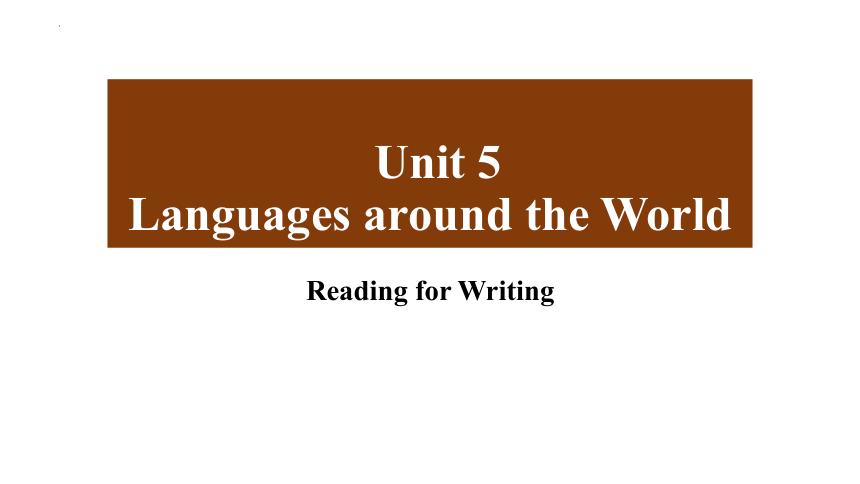 | |
| 格式 | pptx | ||
| 文件大小 | 5.1MB | ||
| 资源类型 | 教案 | ||
| 版本资源 | 人教版(2019) | ||
| 科目 | 英语 | ||
| 更新时间 | 2023-12-01 18:18:39 | ||
图片预览

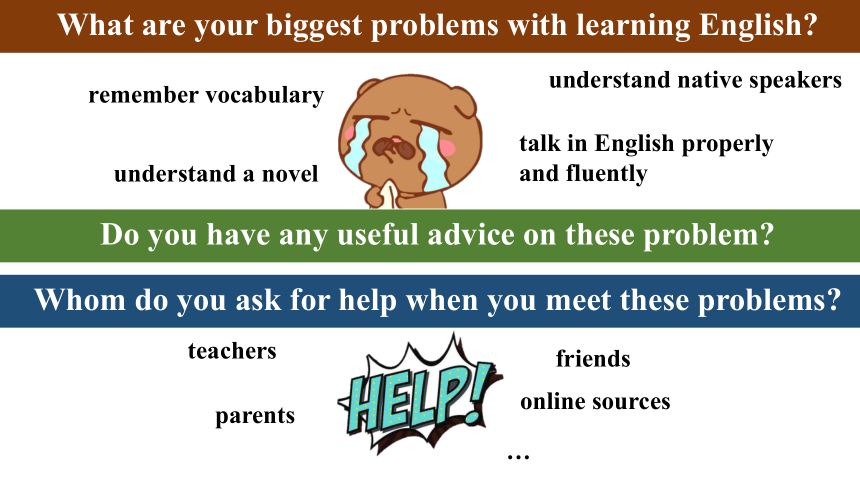

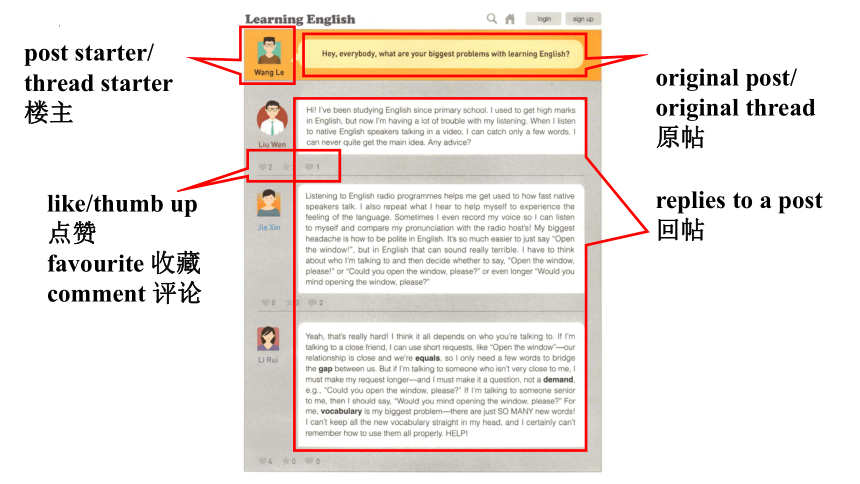

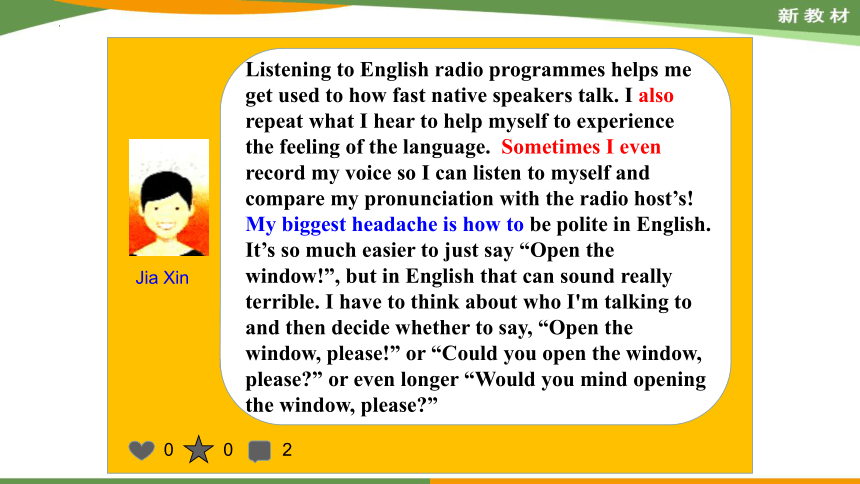
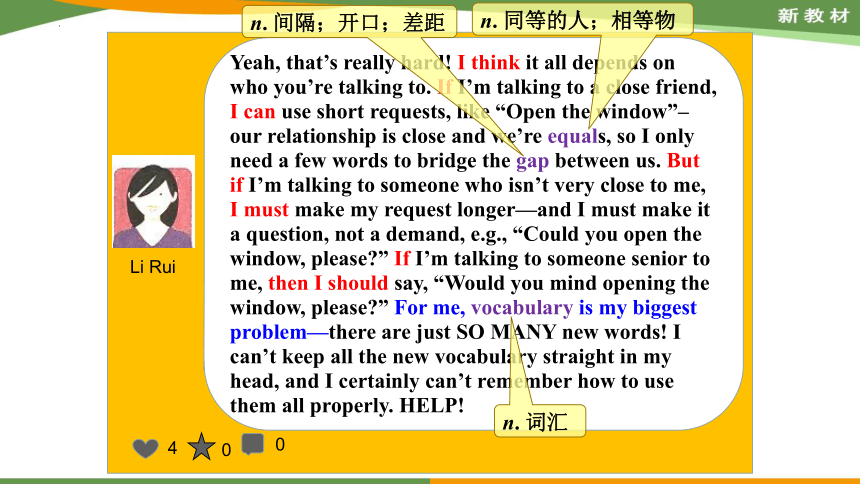
文档简介
(共19张PPT)
Unit 5
Languages around the World
Reading for Writing
What are your biggest problems with learning English
remember vocabulary
understand native speakers
talk in English properly and fluently
understand a novel
…
Do you have any useful advice on these problem
teachers
friends
parents
online sources
…
Whom do you ask for help when you meet these problems
Wang Le posted a thread (发帖) on an online forum.
What is an online forum/blog
An online forum is an Internet-based place where people exchange ideas and opinions about one problem.
What are included in an online forum/blog
post starter/
thread starter楼主
original post/
original thread 原帖
replies to a post 回帖
like/thumb up 点赞
favourite 收藏
comment 评论
Hi! I’ve been studying English since primary school. I used to get high marks in English, but now I’m having a lot of trouble with my listening. When I listen to native English speakers talking in a video, I can catch only a few words. I can never quite get the main idea. Any advice
Liu Wen
2
2
1
Listening to English radio programmes helps me get used to how fast native speakers talk. I also repeat what I hear to help myself to experience the feeling of the language. Sometimes I even record my voice so I can listen to myself and compare my pronunciation with the radio host’s! My biggest headache is how to be polite in English. It’s so much easier to just say “Open the window!”, but in English that can sound really terrible. I have to think about who I'm talking to and then decide whether to say, “Open the window, please!” or “Could you open the window, please ” or even longer “Would you mind opening the window, please ”
Jia Xin
0
0
2
Yeah, that’s really hard! I think it all depends on who you’re talking to. If I’m talking to a close friend, I can use short requests, like “Open the window”– our relationship is close and we’re equals, so I only need a few words to bridge the gap between us. But if I’m talking to someone who isn’t very close to me, I must make my request longer—and I must make it a question, not a demand, e.g., “Could you open the window, please ” If I’m talking to someone senior to me, then I should say, “Would you mind opening the window, please ” For me, vocabulary is my biggest problem—there are just SO MANY new words! I can’t keep all the new vocabulary straight in my head, and I certainly can’t remember how to use them all properly. HELP!
Li Rui
4
0
0
n. 同等的人;相等物
n. 间隔;开口;差距
n. 词汇
Read the posts and fill in the table on page 67 (underline the key sentences).
Name Problem Advice
Liu Wen listen to English radio programmes
Jia Xin
Li Rui
Jia Xin's advice
Li Rui's advice
Your advice
trouble with listening to native English speakers
how to be polite in English
remembering new vocabulary
repeat what you hear, record your voice and compare to the radio host’s
use short requests for close friends
use longer requests for people who are not so close
use more polite phrases for people senior to you
Create your own word bank:
carry a small notebook with you everywhere, and add new words when you learn them, learn word chunks instead of single word, learn word formation
Do they talk about their problems clearly If yes, how
Read for some supporting details about the problem and advice.
I’m having a lot of trouble with my listening.
My biggest headache is how to be polite in English.
vocabulary is my biggest problem.
...catch only a few words. ...can never quite get the main idea.
It’s so much easier to just say “Open the window!”, but in English that can sound really terrible.
There are just so many new words! I can’t keep all the new vocabulary straight in my head, and I certainly can’t remember how to use them all properly.
Problem
Supporting details
Supporting details are usually examples or facts that are used to describe or explain the topic sentence.
They can make your description or explanation more vivid and convincing.
What are letters for help
本单元的写作主题是求助信。求助信是当个人遇到一些自己无法解决的问题或困难时向别人请求帮助的一种书信。通常包括三部分内容:
1. 表明写信目的,请求帮助。
2. 要清晰陈述请求帮助的具体内容。
3. 希望得到帮助。注意语气委婉、真诚,并要向收信人表示感谢。
Belle-letter appreciation
Dear editor,
I'm Li Hua. I've been suffering from anxiety disorders (焦虑症) due to great stress of studying since I entered senior high. So I'm writing to seek help from you.
First, I wonder how to follow the teachers in class. With too many and complicated contents, which are far more demanding than those in junior high, I almost go bananas. What's worse, I am totally occupied with mountainous homework every day, leading to my staying up studying late into deep night every day. Most annoyingly, I even have trouble concentrating on my studies, especially when exams are approaching.
Your prompt reply will be highly appreciated.
Yours,
Li Hua
Para.1
The writing purpose (self-introduction may be needed)
Para.2
Analyze the difficulties Li Hua is facing(分层次/要点)
Para. 3
Express hope to receive some help (语气要真诚、委婉)
The organization of a letter asking for help
Try to write a letter asking for help
假设你是高一学生李华,期末考试日益临近,但是你发现在英语学习中遇到了一些困难,请给你的英国朋友Alex写一封邮件,向他求助。内容包括:
1.你的困难;
2.寻求帮助。
注意:
词数100词左右 , 可适当增加细节,使行文连贯
Useful expressions: typical opening (Para. 1)
1. 我是李华,我写信来询问关于 的一些建议。
I’m Li Hua, I’m writing to ask for some advice on .
2. 在 上碰到一些问题,所以我写信来寻求你的帮助。
I’ve had some difficulty with , so I’m writing to seek your help/guidance.
3. 被 困扰(be disturb by..被...所困扰),我迫切需要你的帮助。
Disturded by , I’m in urgent need of your guidance.
Useful expressions: describing problems & transitional words (Para. 2)
Expressions to show problems:
I'm having a lot of trouble / difficulty / problems with sth. / (in) doing...
My biggest headache is ...
For me, ... is my biggest problem.
I have no idea / I wonder how/what...
I'm suffering from ...
I find/feel it hard/ challenging/ a struggle for me to do...
I'm stuck in a dilemma where...
I’m encountering great difficulty in..., which troubles/annoys a lot...
Faced with the problem, I'm totally at a loss.
I am always trapped in such cases where...
Useful expressions: describing problems & transitional words (Para. 2)
Linking words:
1. First,... Second,... Third,...
2. What's worse,...
3. Worse still,...
4. To make matters worse,...
5. What troubles me most,...
6. Most annoyingly,...
Useful expressions: describing problems & transitional words (Para. 2)
Expressions to ask for help:
Could you please be kind enough to do me a favor
I would appreciate it if you could lend me a helping hand.
Faced with / Facing so much difficulty, I have to turn to you for help.
I’m in desperate need of your help.
I do hope that you can give me some good advice on how to…
Useful expressions: typical ending (Para. 3)
Typical ending:
1. I would appreciate it if you could give me some suggestions.
2. I would be grateful if you could offer me some advice.
3. Any of your help would be greatly appreciated.
4. Your prompt reply will be highly appreciated.
Dear Alex, I’m Li Hua. I have met with many difficulties in learning English, because of which I’m writing to ask you for some help. To begin with, vocabulary is a headache for me. Even if I spend much time trying to recite(背) words every day, I often fail to(失败) recall(回想起)them the next day,which really disappoints me. Besides, I really have no idea how to improve English reading ability(能力). I find it difficult to understand some English articles(文章) though there are not many new words in them. Last but not least, what troubles me most is English grammar. There are so many confusing rules(令人困惑的规则)to follow. Would you please introduce some good ways to me about English learning I would appreciate it if you could be so kind as to offer me timely help. I am looking forward to your early reply. Yours,
Li Hua
Unit 5
Languages around the World
Reading for Writing
What are your biggest problems with learning English
remember vocabulary
understand native speakers
talk in English properly and fluently
understand a novel
…
Do you have any useful advice on these problem
teachers
friends
parents
online sources
…
Whom do you ask for help when you meet these problems
Wang Le posted a thread (发帖) on an online forum.
What is an online forum/blog
An online forum is an Internet-based place where people exchange ideas and opinions about one problem.
What are included in an online forum/blog
post starter/
thread starter楼主
original post/
original thread 原帖
replies to a post 回帖
like/thumb up 点赞
favourite 收藏
comment 评论
Hi! I’ve been studying English since primary school. I used to get high marks in English, but now I’m having a lot of trouble with my listening. When I listen to native English speakers talking in a video, I can catch only a few words. I can never quite get the main idea. Any advice
Liu Wen
2
2
1
Listening to English radio programmes helps me get used to how fast native speakers talk. I also repeat what I hear to help myself to experience the feeling of the language. Sometimes I even record my voice so I can listen to myself and compare my pronunciation with the radio host’s! My biggest headache is how to be polite in English. It’s so much easier to just say “Open the window!”, but in English that can sound really terrible. I have to think about who I'm talking to and then decide whether to say, “Open the window, please!” or “Could you open the window, please ” or even longer “Would you mind opening the window, please ”
Jia Xin
0
0
2
Yeah, that’s really hard! I think it all depends on who you’re talking to. If I’m talking to a close friend, I can use short requests, like “Open the window”– our relationship is close and we’re equals, so I only need a few words to bridge the gap between us. But if I’m talking to someone who isn’t very close to me, I must make my request longer—and I must make it a question, not a demand, e.g., “Could you open the window, please ” If I’m talking to someone senior to me, then I should say, “Would you mind opening the window, please ” For me, vocabulary is my biggest problem—there are just SO MANY new words! I can’t keep all the new vocabulary straight in my head, and I certainly can’t remember how to use them all properly. HELP!
Li Rui
4
0
0
n. 同等的人;相等物
n. 间隔;开口;差距
n. 词汇
Read the posts and fill in the table on page 67 (underline the key sentences).
Name Problem Advice
Liu Wen listen to English radio programmes
Jia Xin
Li Rui
Jia Xin's advice
Li Rui's advice
Your advice
trouble with listening to native English speakers
how to be polite in English
remembering new vocabulary
repeat what you hear, record your voice and compare to the radio host’s
use short requests for close friends
use longer requests for people who are not so close
use more polite phrases for people senior to you
Create your own word bank:
carry a small notebook with you everywhere, and add new words when you learn them, learn word chunks instead of single word, learn word formation
Do they talk about their problems clearly If yes, how
Read for some supporting details about the problem and advice.
I’m having a lot of trouble with my listening.
My biggest headache is how to be polite in English.
vocabulary is my biggest problem.
...catch only a few words. ...can never quite get the main idea.
It’s so much easier to just say “Open the window!”, but in English that can sound really terrible.
There are just so many new words! I can’t keep all the new vocabulary straight in my head, and I certainly can’t remember how to use them all properly.
Problem
Supporting details
Supporting details are usually examples or facts that are used to describe or explain the topic sentence.
They can make your description or explanation more vivid and convincing.
What are letters for help
本单元的写作主题是求助信。求助信是当个人遇到一些自己无法解决的问题或困难时向别人请求帮助的一种书信。通常包括三部分内容:
1. 表明写信目的,请求帮助。
2. 要清晰陈述请求帮助的具体内容。
3. 希望得到帮助。注意语气委婉、真诚,并要向收信人表示感谢。
Belle-letter appreciation
Dear editor,
I'm Li Hua. I've been suffering from anxiety disorders (焦虑症) due to great stress of studying since I entered senior high. So I'm writing to seek help from you.
First, I wonder how to follow the teachers in class. With too many and complicated contents, which are far more demanding than those in junior high, I almost go bananas. What's worse, I am totally occupied with mountainous homework every day, leading to my staying up studying late into deep night every day. Most annoyingly, I even have trouble concentrating on my studies, especially when exams are approaching.
Your prompt reply will be highly appreciated.
Yours,
Li Hua
Para.1
The writing purpose (self-introduction may be needed)
Para.2
Analyze the difficulties Li Hua is facing(分层次/要点)
Para. 3
Express hope to receive some help (语气要真诚、委婉)
The organization of a letter asking for help
Try to write a letter asking for help
假设你是高一学生李华,期末考试日益临近,但是你发现在英语学习中遇到了一些困难,请给你的英国朋友Alex写一封邮件,向他求助。内容包括:
1.你的困难;
2.寻求帮助。
注意:
词数100词左右 , 可适当增加细节,使行文连贯
Useful expressions: typical opening (Para. 1)
1. 我是李华,我写信来询问关于 的一些建议。
I’m Li Hua, I’m writing to ask for some advice on .
2. 在 上碰到一些问题,所以我写信来寻求你的帮助。
I’ve had some difficulty with , so I’m writing to seek your help/guidance.
3. 被 困扰(be disturb by..被...所困扰),我迫切需要你的帮助。
Disturded by , I’m in urgent need of your guidance.
Useful expressions: describing problems & transitional words (Para. 2)
Expressions to show problems:
I'm having a lot of trouble / difficulty / problems with sth. / (in) doing...
My biggest headache is ...
For me, ... is my biggest problem.
I have no idea / I wonder how/what...
I'm suffering from ...
I find/feel it hard/ challenging/ a struggle for me to do...
I'm stuck in a dilemma where...
I’m encountering great difficulty in..., which troubles/annoys a lot...
Faced with the problem, I'm totally at a loss.
I am always trapped in such cases where...
Useful expressions: describing problems & transitional words (Para. 2)
Linking words:
1. First,... Second,... Third,...
2. What's worse,...
3. Worse still,...
4. To make matters worse,...
5. What troubles me most,...
6. Most annoyingly,...
Useful expressions: describing problems & transitional words (Para. 2)
Expressions to ask for help:
Could you please be kind enough to do me a favor
I would appreciate it if you could lend me a helping hand.
Faced with / Facing so much difficulty, I have to turn to you for help.
I’m in desperate need of your help.
I do hope that you can give me some good advice on how to…
Useful expressions: typical ending (Para. 3)
Typical ending:
1. I would appreciate it if you could give me some suggestions.
2. I would be grateful if you could offer me some advice.
3. Any of your help would be greatly appreciated.
4. Your prompt reply will be highly appreciated.
Dear Alex, I’m Li Hua. I have met with many difficulties in learning English, because of which I’m writing to ask you for some help. To begin with, vocabulary is a headache for me. Even if I spend much time trying to recite(背) words every day, I often fail to(失败) recall(回想起)them the next day,which really disappoints me. Besides, I really have no idea how to improve English reading ability(能力). I find it difficult to understand some English articles(文章) though there are not many new words in them. Last but not least, what troubles me most is English grammar. There are so many confusing rules(令人困惑的规则)to follow. Would you please introduce some good ways to me about English learning I would appreciate it if you could be so kind as to offer me timely help. I am looking forward to your early reply. Yours,
Li Hua
